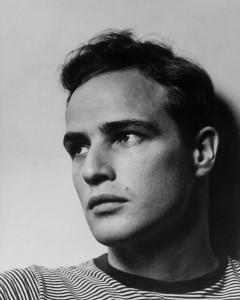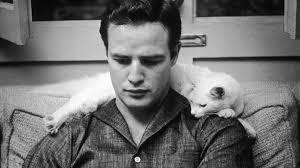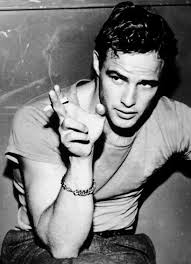 Amy Redmond writes for Film Ireland and goes into Marlon Brando’s heart of darkness and reviews the latest documentary charting the acting legend’s life. Full text here.
Amy Redmond writes for Film Ireland and goes into Marlon Brando’s heart of darkness and reviews the latest documentary charting the acting legend’s life. Full text here.
DIR: Stevan Riley • WRI: Stevan Riley, Peter Ettedgui • PRO: John Battsek, Helen Bennitt, George Chignell, R.J. Cutler • DOP: Ole Bratt Birkeland • ED: Stevan Riley • DES: Kristian Milsted • CAST: Marlon Brando
Award-winning British filmmaker and Oxford history graduate, Stevan Riley has combed through thousands of hours of the self-taped musings of actor Marlon Brando and combined them with studio archive footage and stunning portrait photography to create an engaging and intimate portrait of one of Hollywood’s greatest acting legends. From the outset, we are brought on a journey through Marlon Brando’s life with the actor himself speaking about his experience and craft, often in the third person.
Interspersed with film footage, tons of photography and news reports of the later tragedies that occurred in the actor’s personal life, the use of Brando’s own voice throughout is powerful and revelatory. A digitized image of Brando’s face speaking, opens the film and this device is effectively returned to throughout the documentary. Brando speaking the lines of Macbeth’s “tomorrow and tomorrow and tomorrow” speech, “a tale told by an idiot, full of sound and fury, signifying nothing”, mirrors the actor’s love-hate relationship with the business he chose. He refers to the illusion of success and how he can’t stand it, how it “removes you from reality”. He reflects upon his early days and refers to himself as some sort of confused “mechanical doll” who “felt inadequate because he didn’t have enough education.”
We learn that Group Theatre actor and teacher Stella Adler had a huge impact on his career in the early days in New York and even took him into her home telling him, “Not to worry, that the world would be hearing from him.” Thus, in 1954, Brando became the youngest ever actor to receive an Academy Award for his portrayal of Terry Malloy in On The Waterfront.
Brando speaks about the mythical nature of film, of its power of escape. He maintains that the audience makes the film. The audience is actually doing the acting. The audience wants to have been the “contender” and wants to “have been someone” and feels like the failure too sitting there watching the lighted characters flickering on screen in the dark auditorium. He posits that films allow the audience to play out their fantasies – to kiss the beautiful woman, to beat down the aggressors, to be the hero, to flee from their fears and escape reality briefly.
As a child, Brando would cut lawns and collect bottles to gather together 10 cents to go to the weekly movie. Those hours were a magical escape from the roughness of his father and his poetic mother who was also the town drunk. The pain of his own life fuelled some of his roles. He explains that the actor must bring some truth of himself to each moment but that some roles are closer to the actor’s real life. Brando hovers between having an obsessive love for the craft of acting to a deep hatred of the business. At one point he tells an interviewer, “there is no such thing as a great movie, it’s all money, it’s all bullshit”, and for periods in his life he quits acting altogether in favor of activist work in the civil rights movement and regularly spoke out about the plight of the American Indian and America’s lack of honesty with its own history.
In March, 1973, Native American Indian, Sacheen Littlefeather accepted his Oscar for Vito Corleone in The Godfather on his behalf. Political to the end and careful to choose meaningful work when he could, he also possessed a good sense of humour. His searing honesty about some of the acting choices he’d made in the fallow years are entertaining, especially his references to Candy, the worst movie he ever made. He says he inherited his sense of the absurd from his mother, who herself was an actress. Despite her alcoholism, he was devoted to her, unlike his father who sent him away to military school against his wishes. It was up in the library there, lonely and dejected he’d thumb through copies of National Geographic magazine where he developed his fascination for Tahiti. He would finally visit there one day when he famously turned down the opportunity to star as Laurence of Arabia in favour of starring as Fletcher Christian in Mutiny On The Bounty, which was filmed on location in Tahiti. He speaks of the natural unmanaged faces of the island people comparing their lack of manufacture. He opines that the white man “lives the nightmare of the want of things.”
 Famous for being a reclusive, he bought his own Tahitian island but maintained that rather than seeing himself as an owner, he paid money for the privilege of visiting and spending time with these wonderful natives. Brando’s musings are those of a deep thinker who struggled with his demons and this documentary, with a nod of respect to Marlon Brando’s fierce sense of privacy, tastefully touches upon and manages to illuminate subtly the tragedies that befell his family life.
Famous for being a reclusive, he bought his own Tahitian island but maintained that rather than seeing himself as an owner, he paid money for the privilege of visiting and spending time with these wonderful natives. Brando’s musings are those of a deep thinker who struggled with his demons and this documentary, with a nod of respect to Marlon Brando’s fierce sense of privacy, tastefully touches upon and manages to illuminate subtly the tragedies that befell his family life.
This is a rare view into the life and mind of one of the gems of Western theatre and film. From his electrifying performance as the brutish Stanley Kowalski in Streetcar Named Desire, right up to his hulking, ominous portrayal of Kurtz in Heart of Darkness, we are talked through the ups and downs of his life’s work. It is original and spellbinding for its intimacy as we get a posthumous narration of sorts from the actor himself. A must see for Marlon Brando fans or those interested in an insight into the acting life and the price celebrities often pay for success.
Amy Redmond
15A (see IFCO for details)
102 minutes
See current listing for this film, Listen To Me Marlon at the Lighthouse Cinema in Smithfield, Dublin.

